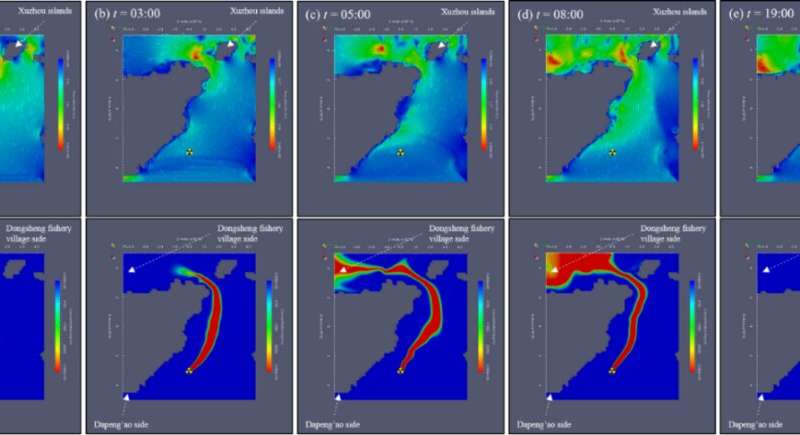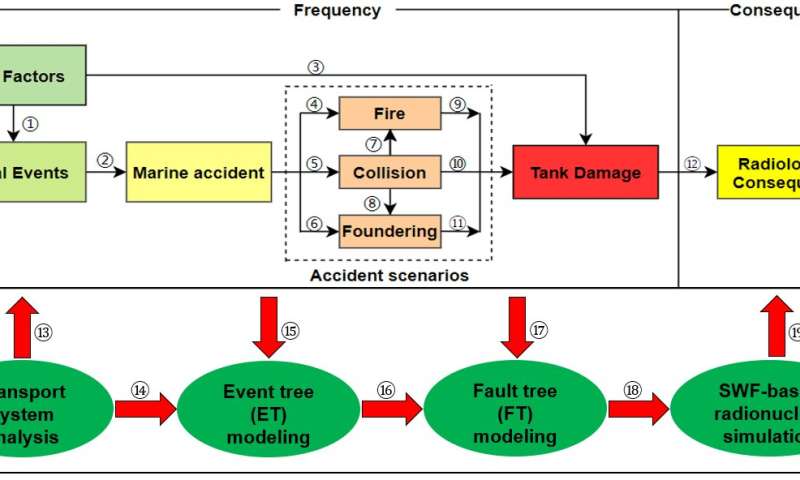New safety assessment methods for off-site transportation of spent nuclear fuel
The safety of off-site transportation of spent nuclear reactor fuel is the foundation of ensuring the back-end circulation of nuclear fuel and the sustainable development of nuclear energy. Performing risk assessment on the transportation of spent fuel can identify potential weaknesses in the system in a timely manner, so that preventive and mitigation measures can be effectively taken to reduce transportation risks.
How to comprehensively identify, characterize and quantify the multiple heterogeneous dynamic risk factors of the complex transportation system, and thus quantitatively assess transportation risks, is the main challenge of current spent fuel transportation risk assessment studies.
A research team led by associate Prof. Ge Daochuan from the Hefei Institutes of Physical Science (HFIPS) of the Chinese Academy of Sciences has proposed a series of systematic risk assessment and route optimization methods, which can effectively reduce the radioactive risk, time cost and economic cost of the road and maritime transportation of spent fuel.
The researchers proposed a radioactive risk-informed integrated path planning (RICPP) method for spent fuel road transportation under multi-objective and weight-constrained route optimization indexes, considering radioactive risk cost, time cost and economic cost, which facilitates the selection of a safer and more economical route.
Due to the lack of comprehensive characterization and quantitative analysis of internal and external risk factors such as human error, ship failure, and navigation environment in the risk assessment of spent fuel maritime transportation, they suggested an integrated probabilistic risk assessment (IPRA) method integrating deterministic and probabilistic modeling perspectives, including comprehensive risk indicators and radionuclide diffusion hydrodynamic models.
-
![New safety assessment methods for off-site transportation of spent nuclear fuel]()
The IPRA methodology framework for spent fuel maritime transportation. Credit: GE Daochuan
-

Dynamic simulation of nearshore flow field (top) and radionuclide concentration (bottom) distribution at different times under the leakage accident scenario. Credit: GE Daochuan
On this basis, the dynamic concentration of radionuclide in coastal seawater was finely simulated and the radiological risk to the public was quantified.
This study could help build a road-sea-rail multimodal transportation support system for spent fuel from nuclear power plants.
In addition, it provides theoretical guidance for the safety design optimization and operation risk management of small modular nuclear reactor, mobile nuclear power supply, small mobile space reactor and other radioactive material transportation systems.
The research was published in Reliability Engineering & System Safety.
China reconnects nuclear reactor after shutdown due to damage
Longlong Tao et al, An integrated probabilistic risk assessment methodology for maritime transportation of spent nuclear fuel based on event tree and hydrodynamic model, Reliability Engineering & System Safety (2022). DOI: 10.1016/j.ress.2022.108726
Citation:
New safety assessment methods for off-site transportation of spent nuclear fuel (2022, September 9)
retrieved 9 September 2022
from https://techxplore.com/news/2022-09-safety-methods-off-site-spent-nuclear.html
This document is subject to copyright. Apart from any fair dealing for the purpose of private study or research, no
part may be reproduced without the written permission. The content is provided for information purposes only.
For all the latest Technology News Click Here
For the latest news and updates, follow us on Google News.


